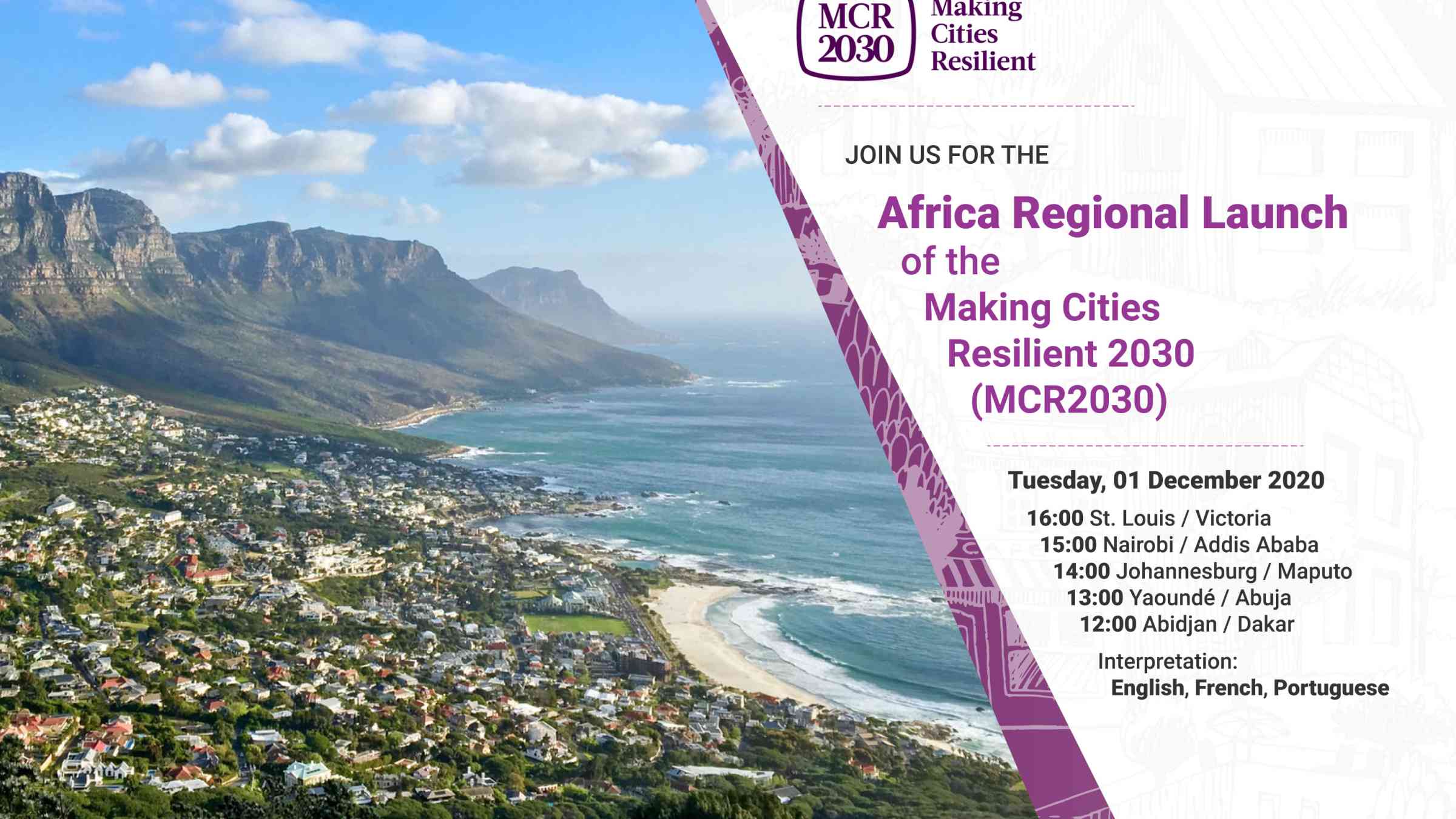Africa Regional launch of the Making Cities Resilient 2030 (MCR2030)

1 December 2020
16:00 St. Louis / Victoria | 15:00 Nairobi / Addis Ababa | 14:00 Johannesburg / Maputo |13:00 Yaoundé / Abuja | 12:00 Abidjan / Dakar
Interpretation: English, French, Portuguese
Background and context
Our future is urban. By 2050, two-thirds of the world’s population will be living in urban settings. We have to make urban living work for us. The cities that we live in now and the cities of the future need to be safe spaces where people prosper and flourish. But cities across the globe are challenged by increasing disaster and climate risk. Extreme weather events have doubled over the past 20 years and are striking cities with increasing frequency and intensity. Rapid population growth in cities can lead to the construction of unplanned risk-averse housing, schools and hospitals, often at the cost of the environment. People displaced by conflicts and natural hazards, escape to the cities, exacerbating inequality and straining cities’ capacity to provide accessible public services.
Over the past ten years, the Making Cities Resilient Campaign (the Campaign), facilitated by the United Nations Office for Disaster Risk Reduction (UNDRR) and delivered together with partners, has advocated around the need for local government authorities to reduce risk and develop urban resilience. Local governments are both responsible for planning to alleviate risk, including through land use planning and other approaches. Local governments are also the first responders when disasters strikes, and their capacities need to be strengthened to manage disaster risks. Now, faced with unprecedented challenges compounded by systemic risk, more than ever, local political and government leaders are in search of viable, cost-effective and sustainable solutions.
The Making Cities Resilient 2030 (MCR2030) responds to this growing need. Building on the success of the previous decade of advocacy work under the MCR Campaign, new partnerships and delivery mechanisms will be used to move from advocacy to implementation, to enable cities to tangibly and measurably improve their resilience to risk.
Making Cities Resilient 2030
The nature of risk has changed. With the increasing complexity of human, economic and political systems (e.g. the international financial system, communications and information technology, trade and supply chains, megacities and urbanization) and how they interact with natural systems (marine, land and air) – risk has become increasingly systemic.
MCR2030 is a unique cross-stakeholder initiative for improving local resilience through advocacy, sharing knowledge and experiences, establishing mutually reinforcing city-to-city learning networks, injecting technical expertise, connecting multiple layers of government and building partnerships.
By delivering a clear roadmap to urban resilience and providing access to knowledge management and monitoring and reporting tools, MCR2030 will support cities on their journey to reduce risk and build resilience. MCR2030 aims to ensure that cities become safe, resilient and sustainable by 2030, contributing directly to the achievement of Sustainable Development Goal 11 (SDG11) and other global frameworks including the Sendai Framework for Disaster Risk Reduction, the Paris Agreement and the New Urban Agenda.
Session objectives
- To highlight examples of disaster risk reduction and resilience by local governments and inspire other local governments to begin a resilience journey.
- To highlight the role of national governments and national associations of municipalities in accelerating risk reduction and resilience implementation at the local level, and to inspire other national governments and stakeholders to scale up urban resilience.
- To invite cities and partners to join MCR2030
Speakers
Moderator: Mr. David Owino, DIRAJ Secretary General
- Mr. Amjad Abbashar, Regional Director, UNDRR Regional Office for Africa
- Ms. Kobie Brand, Regional Director, ICLEI Africa
- Mr. Oumar Sylla, Regional Director, UNHABITAT Regional Office for Africa
- Mr. Adesh Tripathee, Head of Disaster and Crisis, Preparedness, Response and Recovery (DCPRR), IFRC Africa
- Ms. Marilyn Mbogua, Interim Regional Lead Africa & Regional Coordinator- Eastern & Southern Africa, GNDR
- Ms Dorothy Kisaka, Executive Director, Kampala Capital City Authority (KCCA), Uganda
- Mr. Bilubi Ulengabo Méschac, Mayor of the City of Bukavu, D.R. Congo and Chair of the Platform of Local Authorities from Countries of the Great Lakes Region
- Ms. Rohey Malick Lowe, Mayor of the Capital City of Banjul, the Gambia
- Mr. Edson Fernando, Director, Office of the Deputy Commander of the Civil Protection and Fire Service, Angola
- Ms. Pamela Komujuni, Senior Disaster Management Officer, Office of the Prime Minister, Uganda
- Mr. Abdou Sane, Former Member of Parliament and Champion of the Making Cities Resilient Campaign, Senegal

